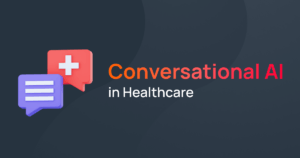Conversational AI in Healthcare has become increasingly prominent as the healthcare industry continues to embrace significant technological advancements over the years to improve patient care. This includes the use of artificial intelligence (AI) and automation.
Specifically, Conversational AI systems involve the use of chatbots and AI assistants such as text and voice assistants to enhance patient engagement and communication. While the technology offers numerous benefits, it also presents its fair share of drawbacks and challenges.
In this article, we’ll explore how Conversational AI, powered by Natural Language Processing (NLP), is reshaping healthcare. We’ll outline its pros and cons, touch on the challenges of adding it to current Conversational AI systems, and discuss what the future might hold for this technology.
Use Cases of Conversational AI for Healthcare
AI for healthcare is being used vastly nowadays. From generative AI in drug discovery to disease diagnosis and helping health system patient care. In hospitals, enterprise chatbots automate routine and repetitive tasks such as taking vitals and delivering medication, freeing healthcare professionals to focus on more complex tasks.
1- Appointment Scheduling
The modern healthcare landscape demands seamless administrative processes. Conversational AI, by rule-based programming, can automate the often tedious task of appointment management, ushering in a new era of efficiency. An intelligent Conversational AI platform can swiftly schedule, reschedule, or cancel appointments, drastically reducing manual input and potential human errors.
Furthermore, AI can help to proactively ensure that patient data is up-to-date, prompting users to fill in missing or outdated information. Such advanced conversational AI systems not only lead to a more organized healthcare establishment but also offer patients a smoother, more responsive experience.
Benefits:
- Efficiency: By simultaneously managing multiple requests, it drastically reduces administrative backlogs.
- Accuracy: The reduction of human touchpoints in scheduling diminishes the chance of errors.
- Availability: 24×7 service means patients can access services at their convenience, not just during office hours. Learn more about Aisera’s customer case study for a healthcare provider.
2- Patient Care Management
With an increasing emphasis on patient-centric care, conversational AI acts as a pivotal touchpoint between healthcare professionals and their patients. It’s not just about facilitating communication; it’s about empowering patients.
With this technology, patients can effortlessly request prescription refills, access their test results, and get details about their medications. By ensuring patients have this information at their fingertips, Conversational AI fosters a sense of autonomy and control over one’s health, making them more engaged in their healthcare journey with a human-like conversation.
Benefits:
- Instant Access: Information is readily available, cutting down on waiting times and potential frustration.
- Enhanced Engagement: Facilitating easy communication, strengthens the patient-provider bond.
- Empowerment: By giving patients control and easy access to their data, they’re more involved and informed about their health.
3- Patient Support
One of the hallmarks of modern healthcare is ensuring patient autonomy and ease of access. Conversational AI, by enabling features like MyChart account creation and password reset, serves this exact purpose.
These might seem like small tasks, but they can be barriers for many patients. By ensuring such processes are smooth, conversational AI ensures that patients can access their health data without unnecessary obstacles, promoting a sense of ownership and trust in the healthcare system.
Benefits:
- User-Friendly: It breaks down complex processes, making them accessible even to those less tech-savvy.
- Reduced Workload: Administrative staff can focus on more pressing tasks as AI handles routine processes.
- Security: Conversational AI employs state-of-the-art encryption and security protocols, especially for sensitive operations.
4- Proactive Patient Reminders
In healthcare, timing can be everything. Missed appointments, delayed vaccinations, or forgotten prescriptions can have real-world health implications. Conversational AI, by sending proactive and personalized notifications, ensures that patients are always in the loop about their healthcare events.
This not only leads to better health outcomes but also fosters a sense of care and attention from the healthcare provider’s side, enhancing patient trust and patient satisfaction too.
Benefits:
- Timeliness: Patients are less likely to miss crucial health events with timely reminders.
- Customization: Tailored notifications mean that the information is always relevant to the individual.
- Engagement: Regular touchpoints keep patients engaged with their health and their providers.
5- Invoice Payment and Claims
The financial aspects of healthcare can often be daunting for patients. The intricacies of billing, insurance claims, and payments can be a source of stress. Conversational AI, by taking charge of these processes, ensures clarity and efficiency.
Whether it’s generating detailed invoices or resolving claims issues, AI does so by integrating with existing healthcare systems, ensuring accuracy and a unified patient experience.
Benefits:
- Transparency: Clear and detailed breakdowns demystify the billing process.
- Integration: Its ability to work seamlessly with EHRs, IVRs, and other systems ensures a holistic approach.
- Rapid Resolution: Automated processes mean faster turnaround times, alleviating patient anxieties.
6- Seamless Bot to Agent Hand-off
While AI is transformative, human touch remains invaluable, especially in sensitive areas like healthcare. Conversational AI recognizes this. By analyzing patient language and sentiments during interactions, it can gauge a patient’s emotional state.
If a patient seems discontented or their issues are too complex, the AI ensures a smooth transition to a human agent. This blend of technology and human touch ensures that patients always feel heard and valued.
Benefits:
- Empathy: The system’s ability to read emotions ensures a more personalized and empathetic response.
- Fluid Transitions: Seamless hand-offs mean patients don’t have to repeat information, reducing frustration.
- Resource Allocation: By handling routine interactions, it ensures human agents are available for more
In addition to these use cases, there’s growing interest in using conversational AI for mental health support, chronic disease management, and patient education. As the technology advances and integrates more seamlessly into healthcare operations, its applications will likely continue to expand.
While conversational AI is revolutionizing patient interactions and streamlining administrative tasks in healthcare facilities, the realm of artificial intelligence has more to offer the healthcare industry. In this video, the CEO of Aisera Muddu Sudhakar explains how to unleash the power of conversational AI and hyper-automation in the healthcare industry:
Unleashing the Power of Conversational AI and Hyper-automation in Healthcare (Video)
In this video, the CEO of Aisera Muddu Sudhakar explains how to unleash the power of conversational AI and hyper-automation in the healthcare industry:
Key Benefits of Conversational AI for Healthcare Providers
Conversational AI technology is rapidly transforming healthcare delivery, improving patient engagement, and enhancing communication channels between patients and healthcare providers. AI-powered chatbots for healthcare are efficient tools for managing patient interactions and improving the overall patient experience. Here are some of the key benefits of conversational Artificial Intelligence for healthcare:
- 24/7 Availability: Conversational AI-powered chatbots can provide round-the-clock assistance to patients, answering their queries and offering support even after hours.
- Cost savings: Conversational AI solutions reduce the need for manual phone calls and human interactions, leading to significant cost savings for healthcare providers.
- Improved efficiency: Conversational AI technology is designed to streamline patient interactions and automate administrative tasks, freeing up healthcare providers’ time to focus on patient care.
- Healthcare data analysis: Conversational Artificial Intelligence technology can analyze patient data and offer insights into health trends and patterns, helping healthcare professionals improve patient outcomes.
- Improved patient engagement: Conversational AI technology can improve patient engagement by providing faster, more efficient, and more personalized communication.
In summary, the benefits of Conversational AI in healthcare are numerous and diverse, playing a key role in improving patient engagement and transforming healthcare delivery. By leveraging the power of AI-powered chatbots healthcare providers can offer better patient care, further healthcare outcomes, improve operational efficiency, and save costs in the long run.
Challenges of Conversational AI in Healthcare
While Conversational AI holds immense potential to transform the healthcare industry, there are several drawbacks and challenges that must be considered. As with any technology, there are both ethical and practical considerations that need to be taken into account before widespread adoption.
Ethical Concerns in Healthcare
One of the major concerns regarding Conversational AI in the healthcare sector is the potential of breaching patient privacy. As AI-powered chatbots become more prevalent in healthcare settings, there is a risk that sensitive patient information could be accessed or shared without proper consent or security measures in place. This could result in serious consequences for patient confidentiality and trust in the healthcare system.
Technical Challenges
Another challenge with Conversational AI in healthcare is the potential for errors or misdiagnosis. This can be caused by AI hallucinations. While AI chatbots can help to improve patient engagement and communication, they may not always provide accurate or appropriate medical advice in real-time. There is also the issue of language barriers and cultural differences, which can limit the effectiveness of AI chatbots in becoming medical professionals in certain contexts.
However, leveraging Retrieval-Augmented Generation aka RAG and fine-tuning LLMs has significantly improved their performance and accuracy. Additionally, employing domain-specific LLMs, such as large language models for healthcare, has proven effective in generating more accurate outcomes.
Finally, integrating conversational AI with existing healthcare systems and workflows presents significant challenges. It requires considerable investment in resources and infrastructure, as well as careful LLM evaluation tailored for the specific industry. Without meticulous planning and execution, the adoption of artificial intelligence in healthcare could create more problems than it resolves.

The Future of Healthcare with Conversational AI
Here are some of the emerging conversational AI trends and advancements that are reshaping the healthcare industry in the near future:
Smart Patient Triage and Symptom Checking
Patients can interact with conversational AI to describe their symptoms and receive preliminary guidance on potential ailments. This not only reduces the burden on healthcare hotlines, doctors, nurses, and frontline staff but also provides immediate, 24/7 responses.
Based on the information given, the AI virtual assistant can advise on seeking immediate medical attention, scheduling appointments, or considering at-home remedies. Additionally, this ensures standardized guidance rooted in established medical protocols, streamlining patient care.
Post-Treatment Care and Support
After medical treatments or surgeries, patients can turn to conversational AI for post-care instructions, such as wound care, medication schedules, and activity limitations. This AI-driven guidance ensures consistent and clear instructions, reducing post-treatment complications and patient anxieties.
It also serves as an easily accessible source of health information, lessening the need for patients to contact healthcare providers for routine post-care queries, ultimately saving time and resources.
Smart Hospital Rooms
Smart hospital rooms are equipped with conversational AI technology that can improve patient experiences and outcomes. Voice-activated devices can adjust lighting and temperature, control entertainment systems, and call for assistance. They can also provide patients with health information about their care plan and medication schedule.
Generative AI in the Future of Healthcare Industry
Leveraging generative AI in healthcare offers the potential to formulate personalized treatment plans by analyzing vast patient datasets. This technology could enhance patient outcomes and optimize resource use. Combined with conversational AI, it promises to elevate the patient experience, merging immediate communication with tailored healthcare insights.
Conclusion
In conclusion, conversational AI is an emerging technology that has the potential to transform the healthcare industry. Our discussion has highlighted both the pros and cons of implementing conversational AI in a healthcare organization and explored its role in improving patient experience, customer service, and engagement.
While the benefits of conversational AI systems are numerous, there are also potential drawbacks and challenges to existing systems that must be considered. These include ethical considerations and concerns surrounding the use of conversational AI without human intervention in sensitive healthcare settings.
Despite these challenges, the prospects of conversational AI healthcare are promising. Emerging technologies and advancements in conversational AI have the potential to revolutionize healthcare delivery and improve patient outcomes. To experience the power of AiseraGPT and Gen AI in healthcare book a custom conversational AI demo today!

